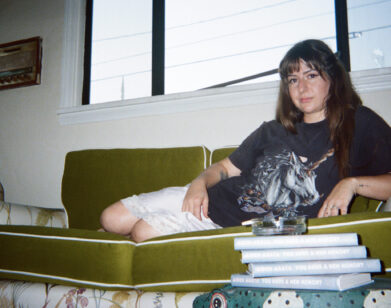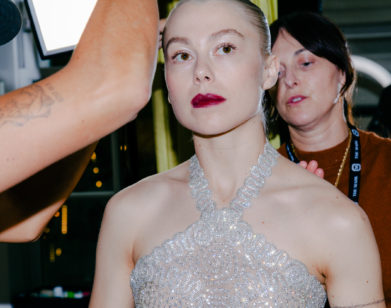Phoebe Bridgers and Brandon Flowers on Transformation and Talking Shit
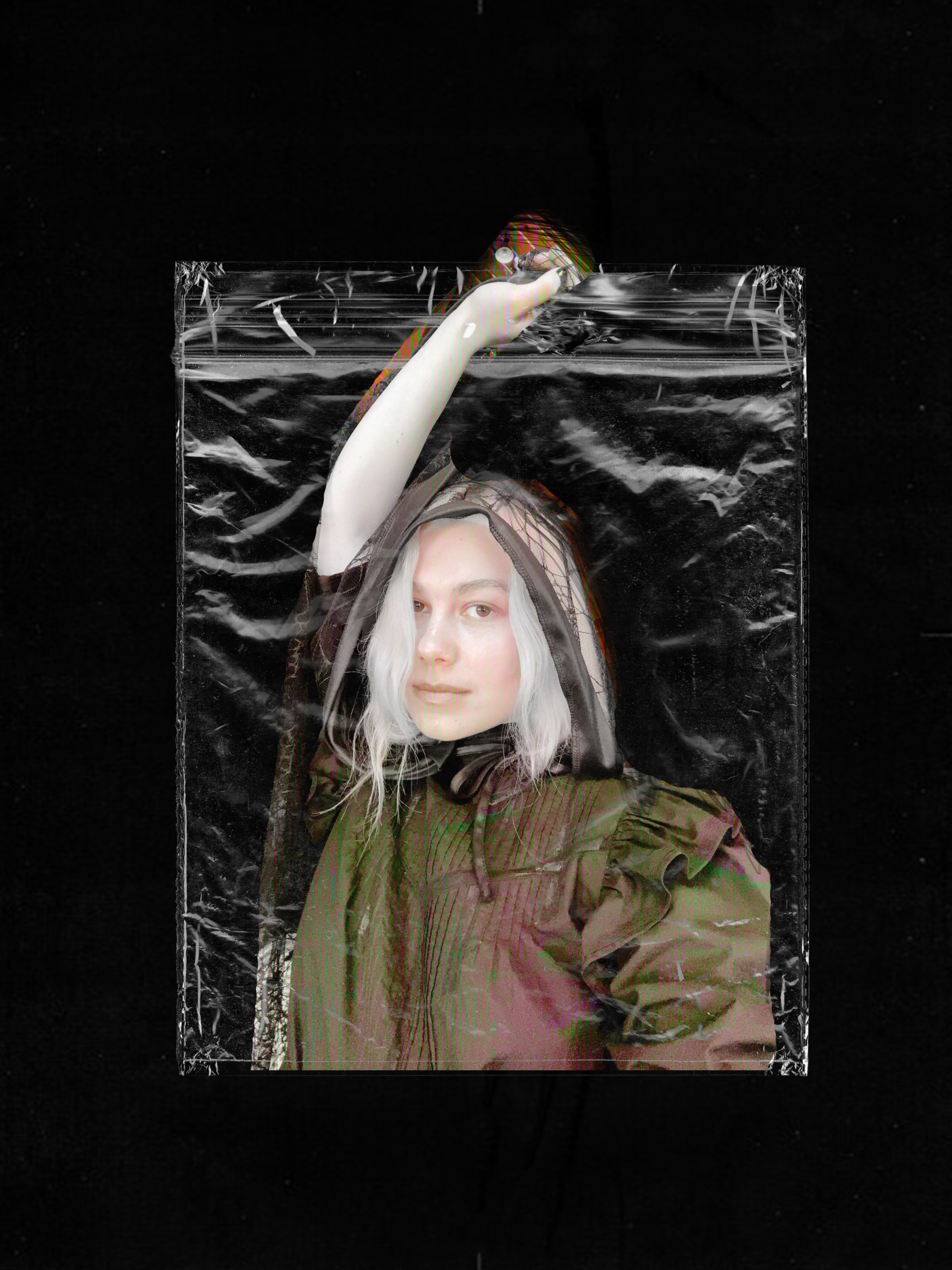
Bowie had the eyepatch. Freddie Mercury had his tank top. Phoebe Bridgers has a skeleton suit. The $19 spandex Halloween staple has become something like PPE for the singer-songwriter, whose sophomore album, Punisher, has cemented the 25-year-old as the most transcendent voice in millennial melancholia. On the album’s cover, she gazes up at a dark California sky, the skeletal bones across her body bathed in red light. In her music video for “Kyoto,” Bridgers stands idly before green-screened Japanese vistas in the same suit, wearing a devilish closed-mouth smile as she lip-syncs about getting bored at a temple, wandering around 7-11, and fielding payphone calls from her negligent father. Like Bridgers’s 2018 breakout hit “Motion Sickness”—about her emotionally abusive relationship with the 45-year-old musician Ryan Adams—it’s a catchy pop song that leaves you with an emotional gut-punch, a reflection of the way leaving home has a funny way of bringing you right back to it. That blend of soft-spoken vulnerability and glazed-over ennui is precisely what has drawn the music world to Bridgers. As part of the supergroup boygenius, releasing a collaborative EP with Lucy Dacus and Julien Baker in 2018, she became a godsend for the nation’s sadgirls (and boys), delivering lyrics like “Always managed to move in/Right next to cemeteries/And never far from a hospital/I don’t know what that tells you about me.” A year later, she teamed up with Bright Eyes frontman Conor Oberst for Better Oblivion Community Center, an indie-rock record-cum-poetry compilation that spoke of seizures on the barroom floor and chasing love like an ambulance.
So the skeleton suit is fitting for Bridgers, an artist who finds humor in pain, and pain in humor. So too is Punisher fitting for 2020, a year that has tested our collective capacity for morbidity, uncertainty, and the ability to find lightness amidst any of it. But the power of music and a good outfit isn’t lost on her. As she tells Brandon Flowers of The Killers—a band that was seminal for Bridgers as she honed her songwriting skills in her high school bedroom—it makes her feel like a superhero. —SARAH NECHAMKIN
———
BRANDON FLOWERS: How’s it going?
BRIDGERS: Everything sucks, but I’m lucky, and fine. I’m in L.A. still for some reason. People are being stupider than ever. I don’t want to fear for my life at brunch, so I’m hiding more than ever.
FLOWERS: Yeah, I’ve been kind of unscathed, so I count myself among the lucky ones. I worry about my dad. My dad is 75 and he has diabetes, so I haven’t seen him. Hopefully we get some kind of vaccine going, so my kids can see their grandpa.
BRIDGERS: My grandpa is in his late 70s, and he’s a rodeo cowboy. He was for his whole life, and he’s a college dropout who does not believe in wearing masks and stuff. I very much worry about him.
FLOWERS: That’s cool that he’s a rodeo cowboy.
BRIDGERS: Yeah, he rode bulls for my whole life, following rodeos around. It’s wild.
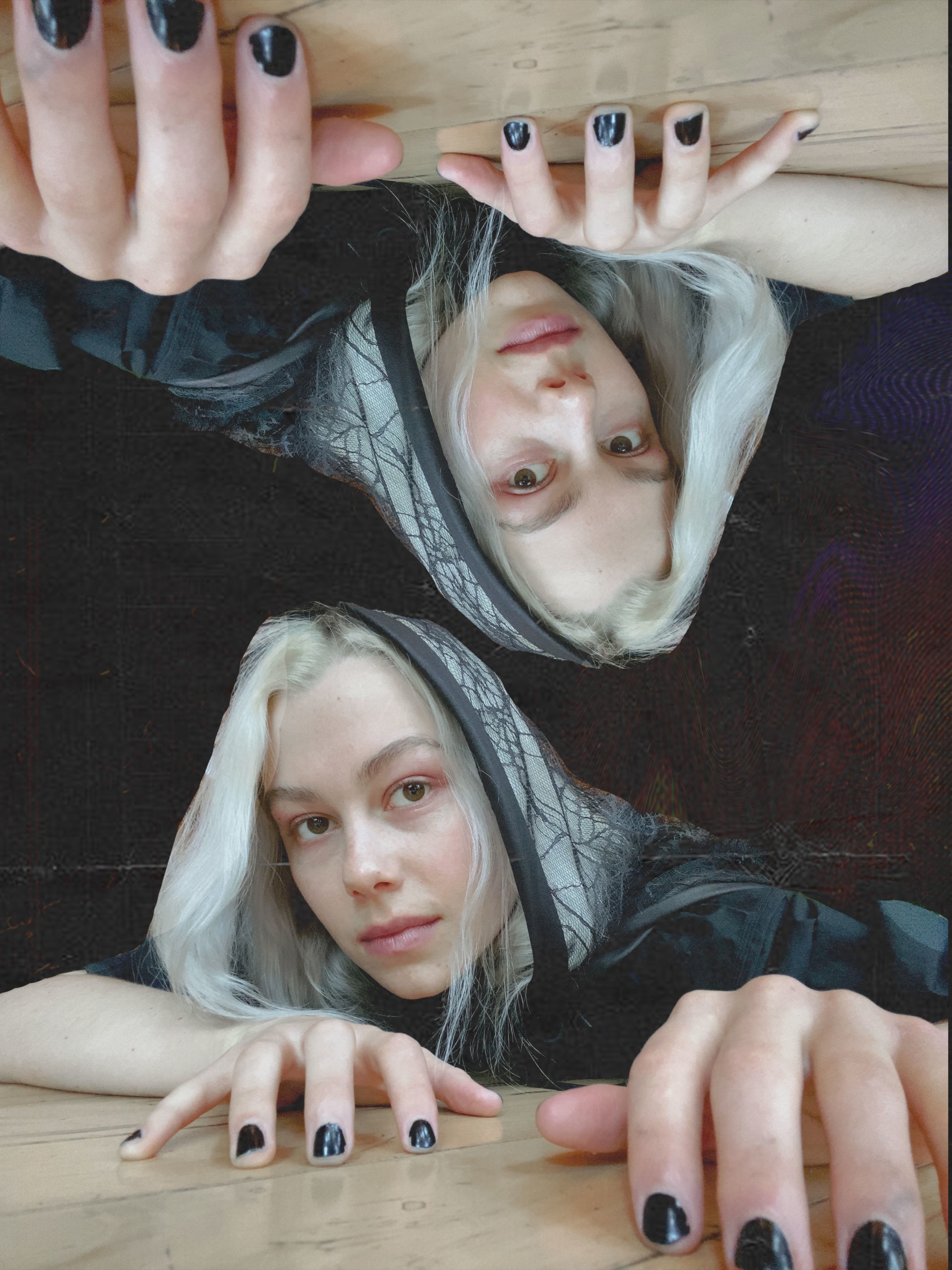
FLOWERS: Those are the toughest people. I grew up in a rodeo town called Nephi, Utah.
BRIDGERS: No way.
FLOWERS: Every year they had this rodeo called the Ute Stampede. And all the kids that I went to school with were there. A lot of them rode bulls. I just remember being in class and looking at their hands—we were 13 or 14, and they just had the most manly hands because of handling rope and riding bulls. I always felt kind of feminine compared to them.
BRIDGERS: This is a constant Conor Oberst riff. He says hello, by the way. Never work a day in your life. Musicians’ hands are always just insanely soft and gentle-looking. Although I did mutton bust, which means riding sheep.
FLOWERS: Oh, wow.
BRIDGERS: I did ride sheep until I was 11, and then my grandpa was like, “Alright, now it’s calf-riding time.” And I was like, “No way.”
FLOWERS: It’s too much. I love “Kyoto.”
BRIDGERS: Thank you.
FLOWERS: Just to come back with something like that after the first record, it’s tough. A lot of people aren’t able to follow it up. Congratulations. Are you from California?
BRIDGERS: I am indeed from California.
FLOWERS: I’m in California right now. I’m up in the St. Helena area. We just get around in an RV. It’s got, like, a giant mural of Monument Valley wrapped around the whole thing. It’s pretty fun to drive around. On two-lane roads, though, it gets a little sketchy when you’re passing other big vehicles.
BRIDGERS: Sweet, the American Dream. Is it a Four Winds brand RV because I love your “Four Winds” cover. It’s a bop.
FLOWERS: Yeah. Thanks. It’s a good song.
BRIDGERS: I’ll send pictures on road trips to Conor, and at one point he was like, “Yeah, dude it’s a company. Like, it says it on pretty much every RV, get used to it.” It’s a crazy song. I feel like it’s just tapped into some other shit. I feel that way about Conor and about you. There are certain writers, like Townes Van Zandt, who are definitely not of this world. But I listen and I’m like, okay, maybe in 40 years I’ll be able to write a song as good as this. You write so differently. You don’t know why it’s sad. It’s like you’re writing from a spaceship about earth.
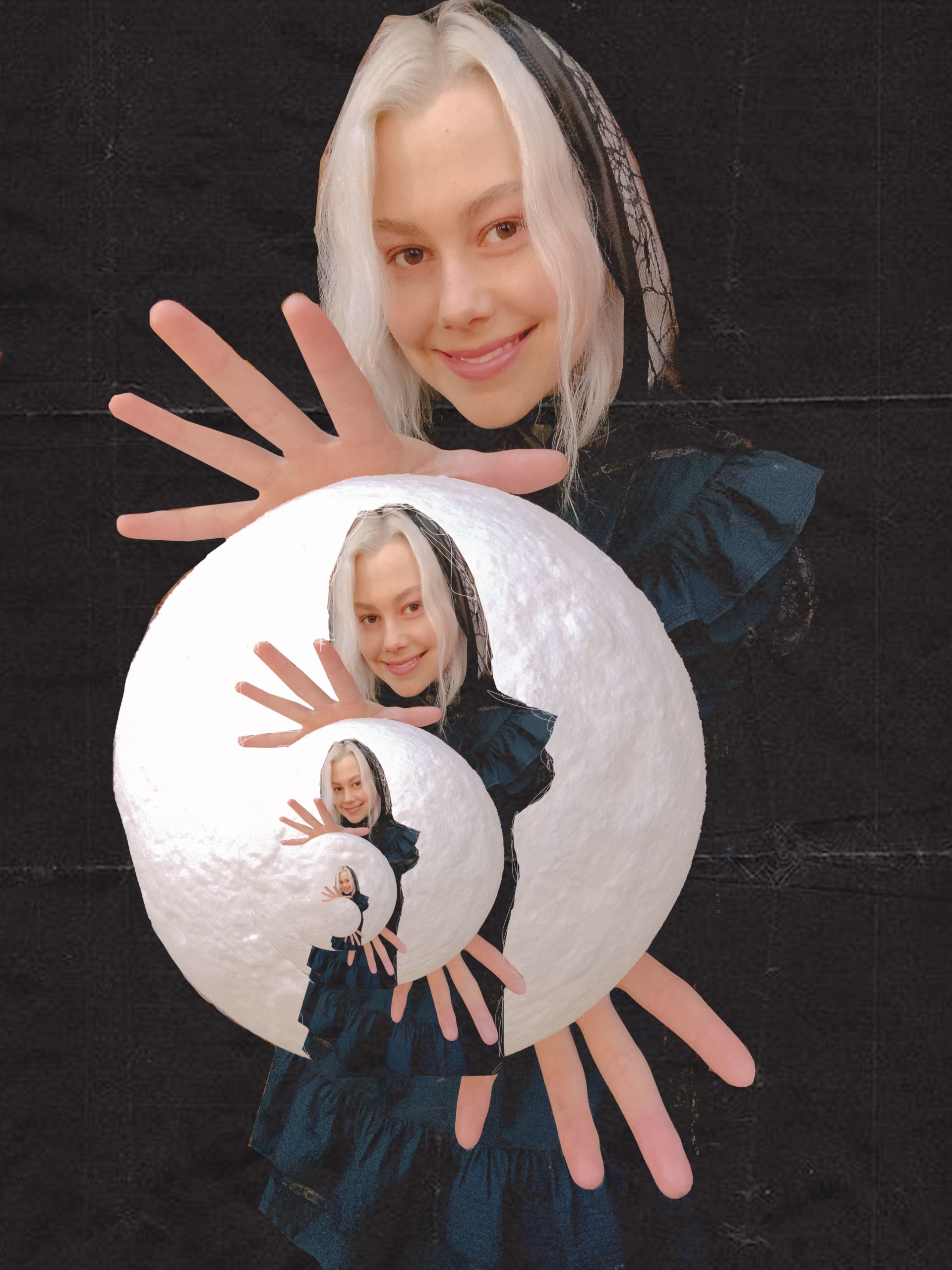
FLOWERS: It’s crazy you bring up Townes Van Zandt. I was going to say we should do [the Townes Van Zandt song] “Pancho and Lefty.”
BRIDGERS: Oh man, let’s do it. I feel like that’s the “Hallelujah” of that genre. And I don’t know why the fuck it’s sad. A bunch of old cops, drinking and talking shit. I love it. What have you been listening to? Are you making stuff at all?
FLOWERS: I haven’t been listening to a ton of stuff because we’ve been virtual mixing and mastering our album remotely. We just have one more song to master, and then we’re done. So I’ve just been deep in that. But I had an interesting thing happen, where I just kept writing when everything shut down. Usually that’s when I’m gearing up to go on tour, when an album is finished. My brain was tapped in and sort of on this treadmill of that cycle of writing.
BRIDGERS: I had a similar thing happen. I love it when people cancel plans, even if I’m looking forward to it. I feel like I’m so bad at giving myself free time, that then I’ll actually do something with that time. This felt like that in such a bigger way—the first two weeks of this stuff. And then I started to spiral pretty hard. Someone wrote a quarantine song that’s really bad. Is it Barenaked Ladies? It’s really funny, but I’ve been trying very hard to steer clear of those subjects. Do you think it’s making it in now?
FLOWERS: I’ve dabbled with it, but I’m not going to do a whole record about it or anything. No way.
BRIDGERS: I think I said “quarantine” in one song and then I was trying to find a rhyme for it. I was like, I can’t do that.
FLOWERS: That’s fine.
BRIDGERS: I’m curious about your relationship to Alex Cameron, because he’s one of the best to me. And I know that you guys wrote together on both of your records, right?
FLOWERS: Yeah, that’s right. I scan Spin or NME and see whenever they’re showcasing someone new. They’ll always have a link to a video or whatever, and I just checked out. He had a song called “Mongrel.” It was so incredible. And then I found the rest of Jumping the Shark. I try to make a habit of reaching out to these people if I’m into them. Because, I used to be—what would the word be—I was just kind of a shit. When we first started, I used to trash talk a lot of people. And so I started making an effort to, if I like something, reach out to someone, so I did it to Alex, and we just kind of hit it off and worked on a couple of things together since. He’s a real force of a writer, too.
BRIDGERS: He has manifested you as someone who’s actually from Vegas. He’s co-opting your culture in the coolest way. He’s like, “All right, if you grew up in Vegas, what do I talk about?”
FLOWERS: That’s funny. I had a similar experience with you. I should’ve called you. When I heard your first record, I had read about you, and I was listening to a college station in Utah, and I heard “Funeral.” I just knew that it was this person that I read about. I had hoped it was you because if it wasn’t that meant that there was somebody else that had something that good that it had been written about. I was like, it better be her because otherwise there’s another one. And, I looked it up, and it was you.
BRIDGERS: Thanks, man. That song is funny. It’s interesting to me which songs stick out to certain people. I love that about music—when you think you’re pretty sure what somebody likes about your music, and then they say a song that you weren’t expecting, and it immediately throws you into a super deep conversation. I remember pretty early right after my record was released, John Mayer tweeted at me about that song. And, I was like, what? Of all my songs, if you were to tell me that John Mayer likes my music, I don’t know that I’d pick that one.
FLOWERS: It transcends. Okay, let me ask about the skeleton pajamas. Have you seen Karate Kid?
BRIDGERS: Not since I was little. Are there skeleton pajamas in there?
FLOWERS: Yeah, it’s a pretty famous scene where the Cobra Kai, the bad karate kids, jump the Karate Kid at a high school Halloween party. They’re wearing one-piece pajamas, but with skeleton bones on them. I would do that for Halloween, probably, if I didn’t already do it two years of my life.
BRIDGERS: Yeah, I feel like a superhero. I love dressing up. It’s very freeing. I feel like some people, their identity is wrapped up in not dressing up. They think it’s corny to dress up for stage. But I actually love the ritual of putting something on, and it’s like, “Now I’m on stage.” I get in the habit of staring at my phone for too long backstage, when it’s the 45 minutes before the set, and there’s not enough time to do something, but it’s too much time to do nothing. And, so I’m just feeling shitty, and maybe hiding in my bunk, or something. Putting something on kind of makes that time into a task. How do you feel about dressing up on stage?
FLOWERS: Yeah, that definitely was that for me. I feel like being from Las Vegas kind of gives us some liberties, and we’ve definitely taken advantage of that. I like the showbiz side of it. It was armor for me.
BRIDGERS: Totally. I missed the feather cape. Bring Back The Feather Cape 2020.
FLOWERS: We had just had this album, and it had “Human” on it, and people were kind of trashing it. People were confused by the lyrics. And weirdly, putting that jacket on and going out onstage, it was just a shield. But as I’ve gotten thicker skin, it’s more about the ritual, like you talk about. Once I start the process, my brain starts getting ready for what we’re about to do.
BRIDGERS: What bad thing did anybody have to say about that song?
FLOWERS: I’m really proud of the verse lyrics, and I always thought that those explained the chorus. For some reason, people just really zoomed in on whether or not “dancer” was plural. Or whether I was saying “dancer.”
BRIDGERS: So, wait, what is it?
FLOWERS: It’s dancer.
BRIDGERS: Okay, thank god, because I feel like I’ve been in that argument. I was obsessed with that record. My mom knows because I would cry to that song every day in the car. But, I feel like the argument about the lyrics kind of added to the lore of it to me because I wasn’t in adulthood review world. I didn’t consume music through what adults thought of it, I consumed it through—
FLOWERS: Your heart.
BRIDGERS: Exactly. I try really hard to listen to stuff before even talking to my friends about it. So, you’re saying the feathers were kind of about, “screw you, the song’s rad, I’m proud of the song?”
FLOWERS: It just made me feel empowered somehow. I don’t know why.
BRIDGERS: I mean, you’re literally wearing wings.
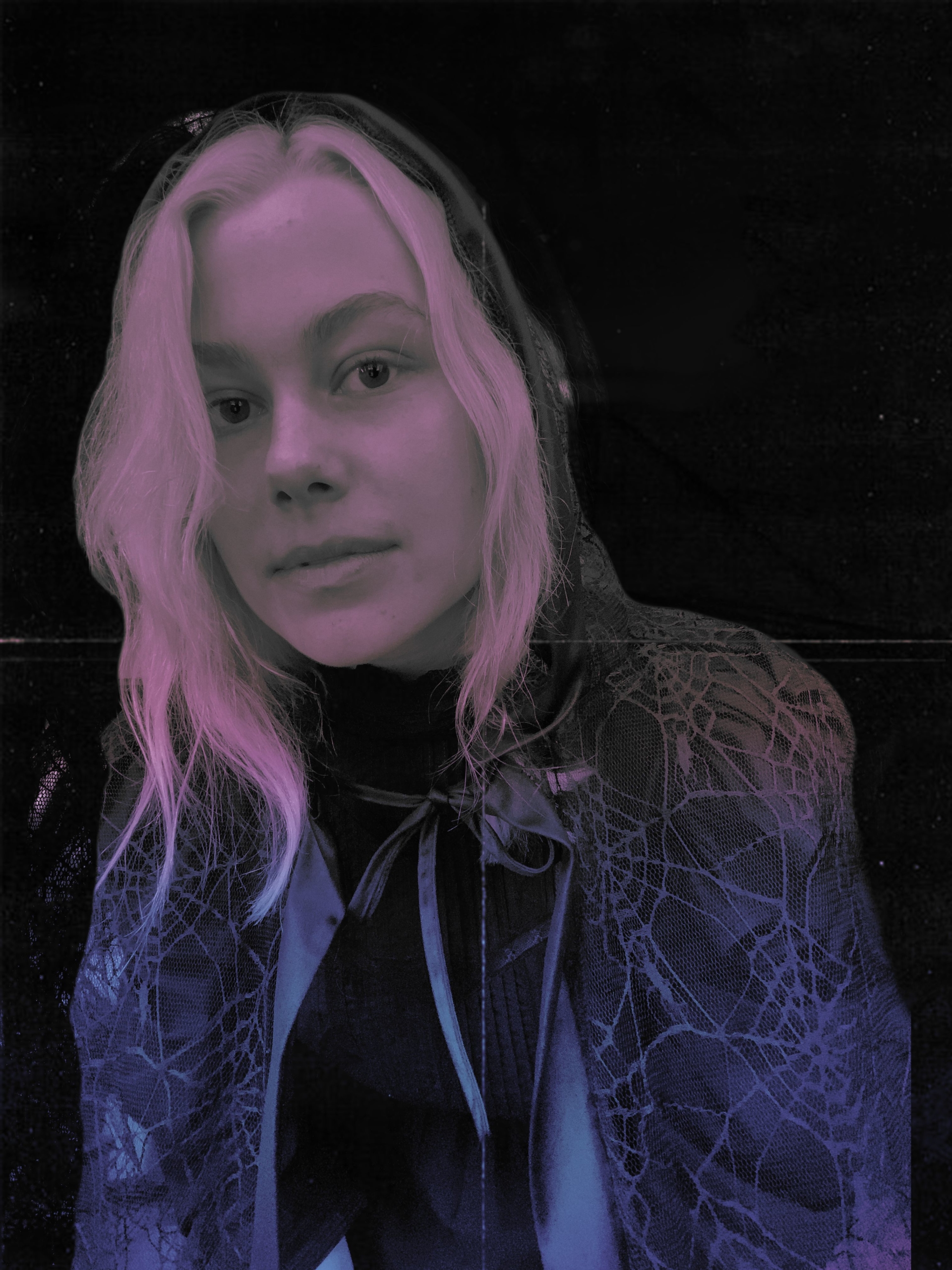
FLOWERS: I think I needed something because I wasn’t comfortable with being a creative person or an artist. I feel like I had to become someone else onstage. I came from a very regular working class family, and all of a sudden I was supposed to be onstage, and it was like, what do I do? The Strokes had just blown the doors open when we were starting. My first reaction was just, I don’t know, do something similar to Julian [Casablancas].
BRIDGERS: There’s this magical power that men in music have to reclaim femininity. Like, if dancing around onstage is offensive to you, then look at everybody who’s ever been onstage—Bruce Springsteen, David Bowie. This is kind of a weird question, I feel like I’m collecting my answers as if I have a thesis I’m writing for a college I don’t go to. But between Bright Eyes and the 1975,teenage girls have invented a lot of my favorite bands. And the Killers, too. There are boyfriends in the world who are like, “Well, that’s stupid” because they’re jealous that their girlfriend is obsessed with this handsome poet. Do you think you’ve been thrown into those conversations?
FLOWERS: For sure. I was not a product of my generation. Grunge was king when I was coming of age, and I just didn’t have any angst in me. I just loved pop music. My brother handed me down The Cars, New Order, and The Smiths, so I just started off right on that foot. When we were first starting The Killers, we had this guy that we were trying out, and he had wisdom, because he was 12 years older than we were. He talked about how you needed to get the girls to come to the gigs, and he would say they’ll bring their boyfriends. Their boyfriends would come along, and then you’ve got twice as many fans. He had this kind of mapped out.
BRIDGERS: Genius.
FLOWERS: I had never even thought past writing a song.
BRIDGERS: It’s true. I mean, when people try to belittle bands because girls like it first, I’m like, The Beatles, man! The Beatles were handed to you by teenage girls.
FLOWERS: Absolutely.
BRIDGERS: When I was in high school, I was in a lot of conversations with boys two years older than me who were like, “Well, of course you like that music.” That’s always been interesting for me, how dismissive people can be of teenage girls’ tastes in music. Even, with like, Carly Rae Jepsen.
FLOWERS: They disregard the nuances, the artistry, and all of that.
BRIDGERS: There’s something I love about looking out into a crowd, and seeing the adult man who’s clearly there by himself crying. Who are the recurring characters for you when you play a live show? Because for me, it’s festival mom, guy crying by himself, guy who’s trying to start a mosh pit for some reason. And lots of couples making out. It’s great.
FLOWERS: [Laughs] We get a little bit of everything. It’s crazy, it’s been 16 years since our first album came out, so we’re still getting new fans, and we’ve got people who have kids now and are bringing their kids, and that whole thing.
BRIDGERS: Wow, that’s super wild.
FLOWERS: It will happen to you.
BRIDGERS: Occasionally I see the adorable kid with the huge headphones. I love a toddler with complete noise cancellation headphones that was dragged to a show. I love solo German guys with an entire stack of vinyl, too. When I’m in Europe, nobody’s there with a group of friends; the entire audience is people who came by themselves with their vinyl. Are you with your kids now?
FLOWERS: Yeah, I’ve got three boys. They kind of love being in quarantine. It makes you realize how much school is just kind of a babysitter. They still want to be with their parents, and there haven’t been any complaints.
BRIDGERS: I feel like that would be a perfect time. I’m so grateful I’m not in high school right now—that weird feeling where you’re almost an adult, and you don’t want to live with your parents, but being trapped. I feel like 16, 17 would have been the worst possible time for this to happen. What would be the worst time in your life for you to be quarantined?
FLOWERS: My heart goes out to the bands that are just about to break. If I was just about to go on my first tour to open for British Sea Power—those were humongous gigs for us. They were transitional, and we learned so much.
BRIDGERS: Oh man, totally. It’s hard enough to even release music as someone who has music that people know. My friend Christian Lee Hudson was about to do a Magnetic Fields Tour. I just have so many friends that were stopped in their tracks. The middle class is disappearing, and in my scene, it means middle class musicians—people who have day jobs, and then play music. It’s getting harder and harder to afford to go on tour, and bands are needing more and more label support. But also, the hopeful way to look at that is a lot of the places that are surviving are DIY or indie venues.
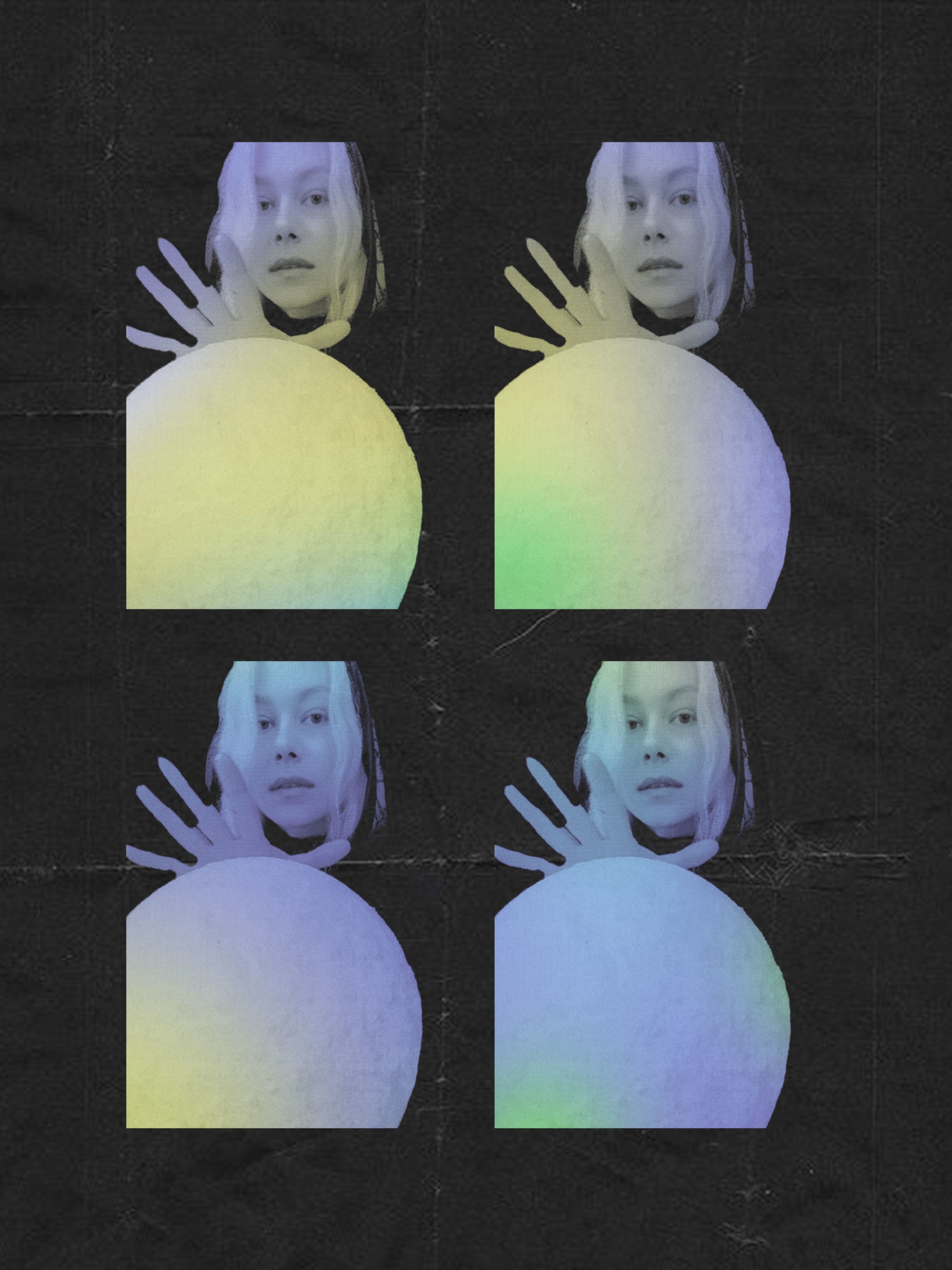
FLOWERS: There’ll be a resurgence. Hopefully it’ll happen. How old were you when you fell in love with music? And what was firing on a radio at the time?
BRIDGERS: I was lucky enough to have nerdy music parents. So I don’t even remember really what was on the radio. Actually, The Killers, Bright Eyes, and Elliott Smith were some of the first stuff that I discovered by myself without my parents showing me. But I grew up around a lot of Townes Van Zandt, Tom Waits, Nina Simone, Jackson Browne. My brother’s named after Jackson Browne.
FLOWERS: That’s really cool.
BRIDGERS: Yeah, but I think I fell in love with music a little too early. When I opened my mouth to sing when I was six years old, my mom was like, [in Southern accent] “She’s going to be famous.” Somehow, she needed a Southern accent for that. I think she just pumped me full of self-confidence. And then at probably 12 or 13 I started writing songs, and I think I had a little bit of a god complex where I was like, “Yep, I’m Bob Dylan. Here I am.”
FLOWERS: My mom would tell this story about my first day at piano lessons, where the teacher came out to the front yard and stopped her and said, “He’s going to be a composer.” I don’t remember it happening, but if it did, I think this piano teacher just did that to every new student that she had.
BRIDGERS: That’s a genius tactic. That’s a way to guarantee that the mom is going to keep paying for piano lessons.
FLOWERS: My mom loved telling that story.
BRIDGERS: I was such a little shit to my mom for making me do piano, and I am not good at piano. I had this superficial Russian piano teacher, and I feel like a lot of my fear of tasks and things that are like homework are probably rooted in that. I was definitely not a composer as a child. I’m learning some theory one piano right now. That was my quarantine task for myself.
FLOWERS: You’re doing fine without it. Sometimes you don’t want to learn too much theory.
BRIDGERS: Matt [Berninger] from The National—we were recording something and he played one chord on guitar and was like, “That’s it, that’s the music I know.” I was like, “What?” He’s like, “Yeah, I just want to be able to romanticize my friends who play instruments. I want to write lyrics and sing over it, but I never want to know any more than that, so that there’s mystery to it.” I would like to believe that that’s my mindset of not learning more instruments, but it’s not. I just don’t like practicing. Theory’s a lot of rules.
FLOWERS: I think it can get in the way if you already have a knack and know your way around melody. I’m sure people would disagree with me.
BRIDGERS: Do you like The Faint?
FLOWERS: Yeah, they were one of the Saddle Creek bands we were listening to when we were first starting. That album Dance Macabre was so good. I remember we saw them open for No Doubt in The Joint in Hard Rock, in Vegas.
BRIDGERS: I’m laughing, because I know a story where they decided to prank No Doubt, and Todd [Fink] ran onstage naked during “I’m Just A Girl” and got arrested.
FLOWERS: Oh my god.
BRIDGERS: The Mayor of the town and his children were at the show. I love how shamelessly weird those guys are. Have you ever been pranked, or pranked another band? I haven’t really, truly gotten the opportunity to do that, except in my own band. We made this giant blanket of our sound guy’s face and had it in the bunk waiting for him to notice. But that’s pretty minor. Have you ever been pranked?
FLOWERS: No, never. No public pranking. But there’s still hope.
BRIDGERS: Yeah. I miss tour.
FLOWERS: For sure. It’s a big part of my identity. I don’t know who I am if I’m not being looked at.
BRIDGERS: And then you kind of kick against it when you go home. I feel like I want to look out at something and not have all those eyeballs looking back at me when I get home.
FLOWERS: I can’t wait to get home when I’m on tour, no matter how great it is.
BRIDGERS: I have a friend who’s a music journalist who has an analogy that I love. It’s like when your dad catches you smoking a cigarette, and then makes you smoke an entire carton of cigarettes. It’s like, “You think you like music? Do you like 30 nights in a row with no off days? Just talking to someone in Germany who hates you? Every day?”
FLOWERS: That’s a good analogy. My dad caught my brother smoking and did that whole thing to him. It worked.
BRIDGERS: Did you ever smoke cigarettes? I feel like with your voice, you didn’t. There’s no way.
FLOWERS: I did.
BRIDGERS: No.
FLOWERS: I used to golf when I was a kid, and my mom would drop me off there all day, and grown men would give me Swisher Sweet and chewing tobacco.
BRIDGERS: You were like a 13-year-old, 80-year-old man. Smoking and golfing.
FLOWERS: When I think about it now, it really bothers me, because I have a kid that’s almost 13. When I look at my kid now, and I think of some guy just giving him cigarettes and chewing tobacco, I would want to kill the guy.
BRIDGERS: Well, there is the Nat King Cole thing, where he smoked, like, a million cigarettes, but I feel like it cuts off my range from the top octaves to the bottom octave. It’s just gone when I smoke. I hate it.
FLOWERS: Yeah, you don’t need it.
BRIDGERS: I have one last question. When you say you used to talk a lot of shit, what does that mean? Did you talk about other bands?
FLOWERS: Oh, I talked about other bands. I grew up idolizing Oasis, and they wrote great songs, but they were also just big shit-talkers. For some reason, I thought to gain respect that was part of the territory. And that’s not who I am at all, but there were a few people I ended up calling and apologizing to later on. Then there are still people that I said things about, and I still carry it with me. I still need to apologize to them. I did it to John Mayer.
BRIDGERS: Well, but maybe that was slightly deserved. Sorry. He’s said some stuff in interviews that he could use an apology for, for sure.
FLOWERS: Yeah, but here’s why you don’t do it. I was at a restaurant in L.A., and he comes and sits at a table right near us, and you just feel so bad. I walked up to the table, and he was in the middle of a circle. It wasn’t a square table—he was in between people, so I couldn’t just talk to him. I just addressed the whole table, and I was like, “I said this about John, and I regret it man, and I’m sorry.” He was really gracious about it. The world doesn’t need more negativity.


